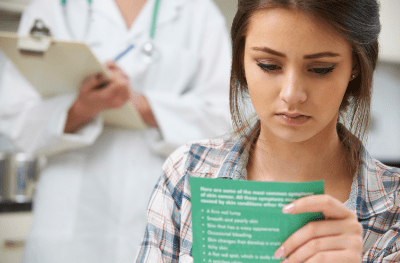

- Anxiety
-
by Kim
With the unprecedented nature of this global pandemic, it is understandable that more people have been experiencing heightened anxiety about their health.
For the last two years, we have been following strict health advice and vigilantly monitoring our bodies for even the mildest of symptoms. It is therefore not surprising that rigorous symptom checking, obsessive googling and panic are becoming more prevalent and persistent than previously.
Health anxiety can manifest in many different ways. Some people might worry they have contracted COVID-19 whilst others may genuinely believe they have an underlying illness such as heart disease or tumours despite normal medical results. Regardless, our mind hyper-fixates on physical sensations and incorrectly triggers our fight or flight response, leading to a cascade of anxiety symptoms and panic.
Health anxiety can be considered a catch-22 situation. The physical sensations of anxiety i.e. racing heart, nausea, hot flushes, shortness of breath, can mimic real symptoms of a range of illnesses which can make people suffering from this anxiety feel extremely exhausted and helpless.
How do I know if my heart is racing because I am nervous about an exam or because I am having a heart attack?
If this sounds like something you may be experiencing, whether it be a recent episode or an ongoing problem, we have a team of experienced psychologists who will be able to support you and help you to regain control over your life.
In the meantime, it is important to acknowledge that health anxiety can be triggered by a variety of factors. Implementing some of the helpful tips below may help you to eliminate or reduce the impact of these anxieties:
1. Limit social media
Whether it be watching an episode of House or reading an Instagram post about vaccine complications, social media can be a huge influence on introducing and reinforcing health anxieties. Taking breaks or changing your settings to hide certain topics may help reduce the frequency of these health-related thoughts.
2. Track your symptoms
Tracking the onset of your symptoms is a really useful way to identify patterns or triggers which may be contributing to your health anxiety. For instance, you might find that your racing heart only occurs right after you finish a large cup of coffee.
3. See your GP for a routine exam
More often than not, people with health anxiety undergo several types of medical tests and return with normal results however if you have not seen your GP, it might be a good idea to book in for some tests in case the anxiety has a physical cause.
4. Focus on activities that make you happy
Investing your energy into hobbies that you are passionate about works wonders in distracting your mind from worrying about your health. The more you can distract yourself, the easier it will be to replace your negative thoughts with more positive ones.
5. Get support
As mentioned, you are not alone. Health anxiety is a common and debilitating mental health problem but thankfully there are several evidence-based therapies that have shown great success in alleviating symptoms. We have a team of online psychologists who are here to help you recognise your triggers and control your anxiety symptoms.
If you would like to book an appointment, please click here or speak with our reception team to learn more on 1800 327 477 (AU) / 0800 327 477 (NZ)

Isabella Seddon
AU Counsellor
To book with Isabella, please contact 1800 327 477
Guest Post By PMW Counsellor Isabella Seddon
Izzy is an Australian counsellor who has completed a Bachelor of Psychology (Honours). She adopts a warm and empathetic approach to therapy and has a particular interest in anxiety-related issues which stem from her experience working on an anxiety helpline. Other areas of interest include, self-esteem issues, Relationship difficulties, Mood issues, Motivation issues, Impulsive behaviours, Stress management, Emotional dysregulation.

